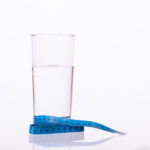By David Blyweiss, M.D.
The summer has truly been a scorcher—dangerously so. With temperatures topping 100 degrees, cities throughout the Midwest and up and down the Eastern Seaboard are setting up cooling stations and doing everything they can to keep air conditioners humming. But, along with seeking out a cooler environment, it’s critical to stay hydrated.
Even when a heat wave isn’t imminent, staying hydrated is key to good health. Your body is estimated to be about 60 to 70 percent water. In fact, your blood is primarily made up of water. What’s more, your muscles, lungs and brain all contain large amounts of the wet stuff. Your body needs water to regulate its temperature and to provide the means for nutrients to travel to all your organs. Water also transports oxygen to your cells, removes waste and protects your joints and organs.
MD Exposes the Hidden Danger to Your Eyes

When your eyesight starts to fail, it's a real problem. Suddenly you can't go to the grocery store... you can't get to the doctor if you have an emergency... you can't meet your friends for dinner…
Your "regular" doctor doesn't have time to keep up with the latest research. And the same goes for eye doctors. They go to school to learn how to fit you for glasses and contacts, but have no way of preventing the damage and loss of eyesight that threatens your freedom and independence.
Let me show you something that explains a LOT about how your eyes work.
In my FREE Special Report, I'll show you a HUGE, untapped resource for your eyes that safely and naturally restores clear, effortless eyesight.
Click here to get started...
Yet 75 percent of Americans are chronically dehydrated. Soaring temperatures and high humidity simply make matters worse and can tip you into the danger zone. Even if it isn’t life threatening, dehydration can interfere with your ability to function. It is the No. 1 trigger of daytime fatigue. A mere two percent drop in hydration can also trigger fuzzy short-term memory problems and make it difficult to focus when reading. And even mild dehydration will slow down your metabolism by as much as three percent.
How much water should you drink? On average, I recommend drinking eight to 10 cups (two to two-and-a-half liters) of water a day. But if you are out in the heat, it’s wise to increase that amount based on your individual needs. For instance, hot or humid weather can cause some people to sweat profusely. If you are one of these folks, you need significantly more water—up to twice the average amount. Ditto for anyone who exercises vigorously (although I certainly don’t recommend exercising in the heat—that’s a surefire prescription for heat exhaustion). An extra cup or two should suffice for short bouts of exercise, but intense exercise lasting more than an hour requires more fluid intake. How much additional fluid you need depends on how much you sweat during exercise, and the duration and type of exercise.
It’s generally not a good idea to use thirst alone as a guide for when to drink. By the time you become thirsty, you may already be slightly dehydrated. Further, as you get older your body is less able to sense dehydration and send your brain signals of thirst. On the other hand, excessive thirst and increased urination can be signs of a more serious medical condition like diabetes. Talk to your doctor if you experience either.
Are You Suffering From...
- Love handles and a pot belly
- Romance that isn't what it used to
- Forgetfulness and inattention
- Low (or no) strength and endurance
- A sex drive that's shifted into neutral...or worse
If so...you may have Mature Male Burnout. Click here to discover more about this unique condition and what you can do about it.
To ward off dehydration and make sure your body has the fluids it needs, make water your beverage of choice. To ensure you are getting enough, drink a glass of water with each meal and between each meal. But it’s also smart to pay attention to where your water comes from. Both tap water and well water can contain contaminates ranging from E. coli to pesticides to chemicals used to make rocket fuel. If you want to know what’s in your tap water, look at your local Water Quality Report, a document required by law to be sent to homeowners annually. Pay particular attention to the MCLG (Maximum Contaminant Level Goal), the highest level of contaminants posing no known health risk. Also look for the MCL (Maximum Contaminant Level), which is the EPA’s enforceable standard for drinking water. Your water’s contaminant levels should be below the MCL and, ideally, at or below the MCLG.
Bottled water’s no better. Several large bottled water manufacturers have been cited for simply adding flavoring to regular tap water. Bottled water also negatively impacts the environment and the bottles themselves can be a source of bisphenol A, an estrogenic chemical that can accumulate in the body’s fatty tissue.
The best way to ensure pure contaminant-free water is to filter your own. Filters can range from whole-house units to faucet and pitcher devices that are designed to remove a wide spectrum of contaminants, including chlorine, mercury, lead, cadmium, benzene, asbestos, pesticides and pipe sediments. Just make sure you choose a system approved by NSF/ANSI (National Sanitation Foundation International/American National Standards Institute). And get the highest rating you can afford since the higher the rating, the more contaminants are removed.
Along with making sure you are well-hydrated, here are a few other tips for staying safe in the summer heat:
- Don’t stay outdoors for extended periods of time.
- Avoid alcohol, tea, soda and coffee. These drinks encourage dehydration.
- Do not exercise outdoors during the hottest time of the day.
- Seek shade if you are going to be outside.
- Wear a hat and lightweight, loose clothing.
- Seek medial attention if you or someone you are with experiences dizziness, headache, hallucinations, confusion, extreme fatigued, a high body temperature, flushing or a fast heart beat. These can be signs of heat stroke or heat exhaustion.
References:
Liberie V. The Importance of Hydration for Athletes. University of Southern Maine. Available at www.usm.maine.edu/conhp/ehss/pdfs/Hydration-Liberi.pdf
Raj SD. “Bottled water: how safe is it?” Water Environmental Research. 2005;77:3013-3018.
Reynolds KA. Risk of waterborne illness via drinking water in the United States. Reviews of Environmental Contamination and Toxicology. 2008;192:117-158






